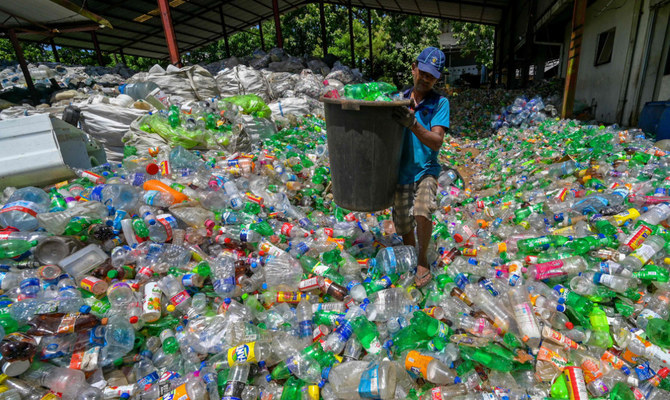
- ARAB NEWS
- 05 Jul 2025

Plastic Free July has become an internationally recognized event that has inspired more than 100 million people in 190 countries to take action. The objective of this global movement is to reduce plastic waste and to encourage governments, organizations and individuals to be part of the solution that addresses plastic pollution across the world.
While plastic is an important resource in itself, plastic pollution has become a key part of the ongoing environmental crisis. Unfortunately, less than 10 percent of plastic gets recycled.
Plastic pollution is causing significant harm to the environment, marine mammals and humankind. About 14 million tons of plastic items are dumped in our oceans every year, poisoning marine wildlife. To put that figure in perspective, it is the equivalent of throwing one load of plastic waste from a garbage truck into the ocean every single minute.
Plastic waste has even been discovered deep in the Arctic ice. Plastic has also made its way into mussels, with one study showing that 100 percent of the mussels it tested were contaminated with microplastics. Meanwhile, about 60 percent of fish that were examined globally contained microplastics.
Every year, plastic pollution kills nearly 1 million marine animals, including dolphins, seals, turtles and seabirds. And there will be more plastic in our oceans than fish in 30 years. According to Surfers Against Sewage, “for wildlife such as fish, dolphins, seabirds and seals, (plastic) can be fatal — they can become entangled or mistake plastic for food. From the dead albatross in the Midway Atoll, stomachs packed full of plastic waste, to the whale found malnourished and dying off the coast of Norway with 30 plastic bags and masses of plastic packaging in its guts, too many incidents illustrate this problem with searing clarity.”
The problem with plastic is that it never completely breaks down. Some plastic bottles can last more than 400 years, fragmenting into smaller and smaller pieces that never fully decompose.
It should not come as a surprise that microplastics are making their way into human bodies as well. On average, human beings reportedly eat more than 18 kg of plastic in their lifetime. One study, published last year, reported that microplastics — which can cause damage to the cells in our bodies — were found in the blood of nearly 80 percent of participants. “Our study is the first indication that we have polymer particles in our blood — it’s a breakthrough result. It is certainly reasonable to be concerned. The particles are there and are transported throughout the body,” said Dick Vethaak, an ecotoxicologist at Vrije Universiteit Amsterdam in the Netherlands.
He added: “We also know in general that babies and young children are more vulnerable to chemical and particle exposure. That worries me a lot.”
Just by taking some simple steps, we can undoubtedly inspire other people in our communities to follow suit.
Dr. Majid Rafizadeh
About half of all the plastic produced in the world is single-use, meaning it is often only used for a few moments before being thrown away. The production of plastic materials has increased significantly in the last few decades, partly due to the fact that it is cheap and cost-effective to make. More plastic was produced in the last 10 years than in the whole of the past century. More than 380 million tons of plastic are produced every year and more than 1 million plastic bottles are purchased across the world every minute.
Unfortunately, the rich and developed countries tend to use more plastic per capita than the rest of the world. The US and the UK are the top two producers of plastic waste per person. For example, when it comes to Americans’ use of beverage bottles alone, more than 100 billion were sold in the country in one year, which is the equivalent of nearly 315 bottles per person. “The process of producing bottled water requires around six times as much water per bottle as there is in the container … 14 percent of all litter comes from beverage containers. When caps and labels are considered, the number is higher,” according to Plastic Oceans International.
There are several steps that each of us can take to become part of the solution when it comes to addressing plastic pollution and protecting our planet. We can start with the Plastic Free July challenge. In order to become part of this global movement, people are challenged to avoid using single-use plastics for a whole month. The idea is that, after a month, this can turn into a lasting habit.
Other simple steps include taking reusable bags when shopping and carrying reusable drink containers to avoid using disposable ones. People can also volunteer and take part in plastic litter picks. Organizers also advise people to avoid using disposable straws and utensils when visiting restaurants and cafes. In their own neighborhoods, people can start an initiative to clean up plastic litter and eliminate the use of disposable plastic bags. You may be surprised to see how many people will join you and the positive change that will follow. One can also volunteer for environmental organizations a few hours a week.
Just by taking these simple steps, we can undoubtedly inspire other people in our communities to follow suit. Then, imagine the ripple effect that changing some of our personal lifestyle habits could have on our planet, on our and future generations’ health, and on marine life.
In a nutshell, Plastic Free July is a reminder of the significant harm that plastic pollution is causing to our planet. It is our responsibility to act. By taking simple steps, each of us can become part of the solution to the problem of plastic pollution.
• Dr. Majid Rafizadeh is a Harvard-educated Iranian-American political scientist.
Twitter: @Dr_Rafizadeh